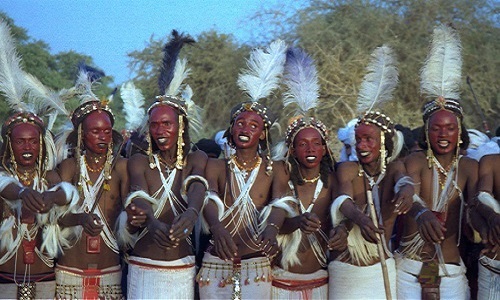10,883 total views, 1 views today
The Fulani people are found in West Africa with high population in Nigeria, Chad, Niger. They speak Hausa, French, English and Fulfulde or Fula language. The Fulani people are Muslims and they follow Islamic laws like the Hausa’s. Cattle are an important factor to them and they are used for every ceremony rites, including marriage rites. There are names,traditions and taboos concerning cattle and the number of cattle owned is a sign of wealth. They fight to preserve their cattle and the major conflict that arises are linked with their cattle. The men are nomadic and pastoral herdsmen as they move amount with their cattle. They are known to be brave, courageous and hard-working. Fulani people are cahracterised by lighter skins and straighter hair.
Marriage in this culture is endogamy and not exogamy. Two people from the same lineage are allowed to marry each other. Marriage is usually between cross-cousins and parallel-cousins. The children are betrothed even before they were born. Caste system and political stratification come into place in their traditional marriage. The reason why marriage is endogamy is to preserve wealth and royal bloodline. They practice early marriage and it is mostly arranged by the families. The men marry in their early twenties while the female marry as teenagers. The men are allowed to marry more than one woman so far he has the ability to cater for their needs equally.
The caste systems are the nobility, merchants, blacksmith and slaves of wealthy Fulani OR the Rimbe caste, Neeybe caste and the Jeyaabe caste. Members belonging to a caste system are not allowed to members belonging to another. Marriage is expected to be restricted to the caste system. Young and unmarried women also have the freedom to choose their partner. This is done during their dance ceremony, where they sleep with many Fulani men and later pick their choice.
There are three stages of Fulani Traditional Marriage System which are the Sharo, Koowgal and the Kabbal Stage.
- The Sharo
This is the flogging process where men are being publicly flogged by other men. This is to test for his bravery, courage, strength and discipline. The prospective groom is not expected to cry and if he does, he is being regarded as a coward and may be rejected by the bride’s family. This tradition is not compulsory in all ethnic groups in their culture. The groom in this stage will be followed by his people who will encourage him during the brutal flogging process.
- The Koowgal Satge
This is a stage where the dowry and the bride-price are paid and the most important part of the ceremony. Here, the dowry, which is herd of cattle are being transferred from the bride’s father to the groom family while the bride’s price that consists of gifts are transferred from the groom to the bride. The groom is also expected to help his father in his cattle rearing. This is known as bride-service. The koowagal legalise the marriage and the most important stage of the union.
- The Kabbal
The kabbal is the Islamic wedding ceremony which can be done in the absence of the prospective couple. After the marriage rites, the wife is being accompanied to her husband’s house and she is being welcomed by the women.
The difference between the Hausa’s view and the Fulani’s view on marriage is on the issues of virginity, celibacy and sex-constraint. Sexual activities before marriage are seen and allowed among the Fulani people while it is warned against in Hausa culture. But, as soon as a lady decides on whom to marry, she is being restrained from their sexual activities and expected to be faithful to her spouse.

Thanks for sharing this.
Thanks for sharing this